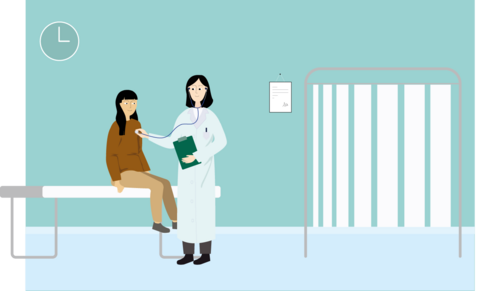Background information
Article 13 RCD (recast) envisages that Member States may require medical screening for applicants on public health grounds.
The EUAA Guidance on Reception – Operational standards and indicators, 2024, Standard 3, makes specific reference to medical screening.
Medical screening is meant as the initial medical examination that may be performed upon the applicant’s arrival in the reception facility. As such, the term does not encompass the medical checks that may be carried out upon arrival in the country (i.e. upon disembarkation or at the borders) where the involvement of reception authorities is generally marginal. It is key to note that medical screening needs to be carried out as soon as possible upon arrival in the facility. It needs to be proportionate to its purpose and, during the medical screening, adequate measures must be taken to ensure the respect of applicant’s dignity.
The medical screening carried out at the beginning of the reception process can provide an important starting point. It facilitates a clearer idea of the applicant’s medical needs that have to be addressed immediately and throughout the reception process. It ensures early identification of physical and mental health-related special needs and provision of immediate medical and psychosocial support.
The medical screening carried out as soon as possible upon arrival in the facility can also prevent any outbreak of contagious diseases inside the centre, thus protecting both the applicants and the personnel.
When and how the medical screening is organised will depend on the national context and procedures. It might be carried out on the day of arrival, before/after registration, before/after reception intake, or in the next days upon arrival at the facility. It might be carried out at once or during different appointments.
It is important to ensure that applicants have sufficient information about any medical screening that they are required to undergo (EUAA Guidance on Reception – Operational standards and indicators, 2024, Standard 5, Indicator 4). For instance, you can explain the following to the applicant: that they have the right to refuse to undergo certain examinations and the consequences connected with such a refusal; the reasons for conducting the medical screening, giving the applicant the opportunity to ask questions; what the examination entails so as to provide them with a clear idea of what to expect, including any pain or discomfort.
It is also necessary that informed consent is obtained from or on behalf of the applicant prior to the examinations. This builds trust, reduces anxiety and helps prepare the applicant to reveal any health issues or concerns that need to be addressed. Take into consideration that people may also have limited health literacy, meaning that they might not be able to understand general health and healthcare procedures, or the language used by the medical professionals.
An individual medical file should be created, at the latest, immediately after the medical screening has taken place. The applicant must be provided with access to their medical records, without prejudice to national legislation.

Information provision messages
Consider providing the following information before and during the medical screening to explain what will happen at this stage and what will happen next. The level of detail will depend on when and how the medical screening is organised as per your national context, as well as on weather certain health checks were already carried out or not.
Inform applicants on the below.
- The purpose of the medical screening: to check if the person is in good health, to provide immediate medical care if needed, to ensure the continuation of medical care or treatment already prescribed, or to ensure they are transferred to a reception centre with the necessary access to specialised services (if allocation takes place after arrival).
- The importance of disclosing any health issues so that the person can receive immediate medical assistance if needed or be referred for further assessment and care (for example to a specialised doctor).
- What will happen during the medical screening and what procedures the person will undergo. For instance, screening for acute and urgent needs for possible emergencies or hospitalisation, screening of contagious diseases or for pest contamination (e.g. bedbugs, scabies), blood tests, X-ray of their lungs to see if they have tuberculosis.
- The purpose of vaccinations against contagious diseases if these are offered at arrival.
- The type of medical care the person will receive while in reception and what to do in case of a medical issue or an emergency.
- The available medical and psychosocial services. For example, the possibility to visit a gynaecologist in case of a pregnancy, the availability of contraception, the availability of vaccines for children, etc.
- What will happen with the medical information collected and how they can access their medical file. Mention that the information collected will be treated with confidentiality and can only be shared with the informed consent of the applicant. Explain the limits of confidentiality according to your national regulations.
- The consequences of refusing the medical screening, if applicable.
Bear in mind that applicants may prefer to be screened by medical staff of a specific gender. Specify if they can choose the gender of the medical staff and if not, explain the reasons.

Practical tips
- Several communication channels should be used to provide applicants with information, adapted to their communication needs. Consider using a picture dictionary with easy-to-understand and universally recognised visuals to facilitate communication on and the understanding of medical issues.
- Specific profiles will need specific information in addition to the standard information provided to all. For example, parents with children should be informed about the availability of vaccines.
- The level of information you will provide before and during the medical screening depends on your national and local context (e.g. daily inflow). Since people might not reveal spontaneously their health issues, such as a certain disease or an early pregnancy, it is important to use this moment to build trust and reduce anxiety among applicants.